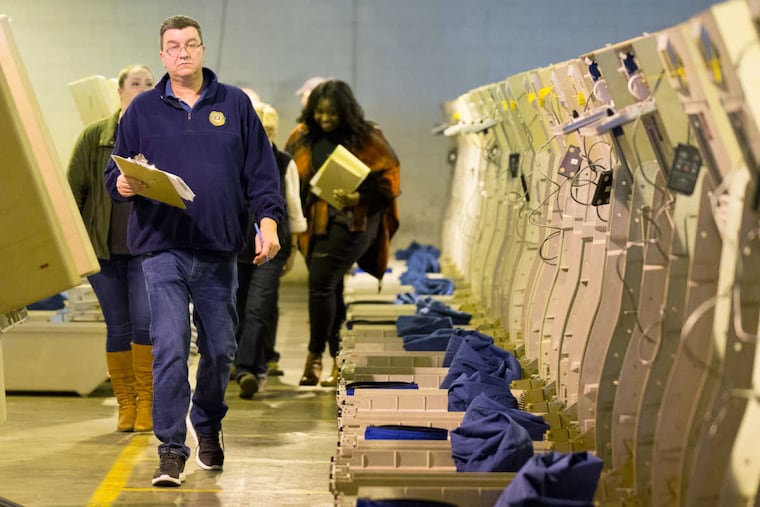After Pa. Gov. Tom Wolf announces $90 million to upgrade voting machines, GOP pushes back
The move comes days after Wolf vetoed a controversial Republican election bill that provided $90 million in funding for voting machine upgrades across the state, but would have ended straight-party voting.

HARRISBURG — Pennsylvania Gov. Tom Wolf announced a $90 million bond issue Tuesday to fund a statewide voting machine upgrade effort that he ordered more than a year ago to ensure that every vote cast creates a paper trail that can be checked by voters and audited.
Republicans who control the state legislature pushed back immediately, questioning the legality of Wolf’s maneuver.
The new money would cover around 60 percent of the estimated $150 million cost for the state’s 67 counties, and answer to months of uncertainty over funding.
“Everybody in this building recognizes that we’ve got to support the counties,” Wolf said. “This cannot be an unfunded mandate.”
House Appropriations Committee Chairman Stan Saylor (R., York), however, called it an “executive overreach.”
“So far, the governor has not stated his legal authority to bond $90 million without legislative approval,” he said in a statement.
The move comes days after Wolf vetoed a controversial Republican bill that would have provided the $90 million but also ended straight-party voting at the polls, a change that leaders of Wolf’s Democratic Party have opposed. That legislation also would have limited the governor’s ability to order counties to update their voting machines.
“I was trying to get the legislature to work with me in partnership to do this, and I think we could do that one way or another,” Wolf said.
Wolf had previously proposed $15 million for voting machine upgrades in the state budget — which several county officials criticized as too little — and no guarantee of future money. That money was ultimately taken out of the budget, and Republican lawmakers attached funding to the bill Wolf vetoed.
The new state funding, which Wolf said will likely come through bonds issued by the Pennsylvania Economic Development Financing Authority (PEDFA), will be distributed as grants from the Pennsylvania Department of State.
Until now, the only money available to counties was $14.1 million in federal and state dollars toward voting machine upgrades.
Republicans said state law prohibits PEDFA from issuing the bond because it does not have the funding to repay it. Though it is the same amount of money Republicans offered Wolf in their bill, Wolf cannot simply issue it through executive power, they said.
“The governor does not have the authority to unilaterally decertify and require replacement of all voting machines, much less the authority to simply use his pen to borrow $90 million to pay for the machines without an appropriation or legislation from the General Assembly,” Rep. Garth Everett (R., Lycoming) said in a statement.
The GOP legislators said they are reviewing the proposal but stopped short of saying they would ask a court to intervene.
Republicans had said Friday that Wolf “fully owns” the impact of vetoing their election bill. While House Republicans indicated they would “continue to be engaged” on the issue, a spokesperson for Senate Republicans said they would not discuss further funding.
Wolf said Tuesday he is still open to negotiation.
“I’m trying to come up with an alternative — if someone doesn’t like that, let’s come up with something else, but in any case, let’s do this,” he said.
Wolf also announced that a small number of counties using older models of hand-marked paper ballot systems will be able to request an extension for replacing their voting machines until June 2021, instead of the April 2020 primary election. But counties receiving an extension will see 57 percent of their costs reimbursed, instead of 60 percent, according to Wolf spokesperson J.J. Abbott.
The statewide voting machine upgrade requires all counties to use new systems with paper trails that voters can verify in plain text before casting their votes, allowing for audits and manual recounts. While some counties have used paper-based systems for years, most Pennsylvania voters have used insecure systems that store votes electronically. State and federal officials have joined security experts in calling for paper-based systems; in January, an independent commission studying the state’s election security made replacing voting machines its first recommendation.
Its second: “The Pennsylvania General Assembly and the federal government should help counties purchase secure voting systems.”
Elections are run at the county level, and officials in many counties had worried they wouldn’t be able to comply with Wolf’s order — at least not without increasing taxes. On Tuesday, several said they welcomed the state funding.
Douglas E. Hill, executive director of the County Commissioners Association of Pennsylvania, noted that the new state funding “will significantly reduce the need for use of local property tax dollars.”
While some counties have been able to move relatively quickly — nine have already replaced their systems — they generally were already preparing to upgrade when Wolf’s order came down.
Montgomery County had planned for several years to buy machines around this time. It used its new system, primarily hand-marked paper ballots that voters fill out and then scan, for the first time in the May primary election. In response to some issues that arose, and in anticipation of high turnout in 2020, the county will purchase more equipment, said Lee Soltysiak, the county’s chief operating officer.
The state funding will help offset the cost of that equipment. State reimbursement could also free up some county dollars to go toward other areas.
“Obviously, it will offset the bill that we’ve already paid, to some extent. Now, there is some fine print to understand in terms of exactly which costs will be eligible for reimbursement, so we’re still sorting through that, but it’s certainly more than we had yesterday,” Soltysiak said. “It really is terrific that they were able to follow through on that.”